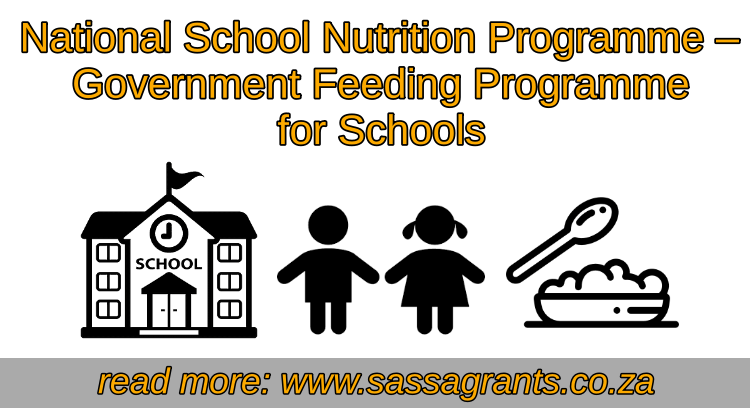All about the National School Nutrition Programme (NSNP) – Government Feeding Programme for Schools
The National School Nutrition Programme (NSNP) was established by the South African government with the aim of providing primary and secondary school learners with a nutritional meal.
Through the NSNP, the South African government aims to increase learning capacity for young learners with the help of a nutritious healthy school meal. At schools where the NSNP has been implemented, educators have seen a vast improvement in their learners’ morale, punctuality, concentration, and attendance.

The NSNP is part of the government’s Integrated Food Security Strategy for South Africa, established in 2002. The Strategy was made possible with the aid of the Department’s of Social Development, Health, Agriculture, and Land Affairs. The NSNP is a portion of the many projects that the South African government has in place to address nutritional needs, however, it does not necessarily cover extreme/ all problems of hunger, poor nutrition, or food security that many still face.
Through the NSNP, schools are also encouraged to create food gardens which will allow them to harvest fresh items such as fruit and vegetables. In doing this, participating schools are able to supplement the meals they provide to their students in accordance with South African Food Based Dietary Guidelines. The NSNP also encourages learners, parents, and teachers to enhance their skills by growing their own food, thus aiding in household food security over the long-term. Establishing gardens in schooling environments can also aid in teaching and learning practices, as well as add beauty to the childcare environment.
Who qualifies for school feeding?
The NSNP is aimed at students from underprivileged Primary and High schools (quintiles 1-3). Schools are selected based on the income of their student’s households (should the majority of the school’s learners come from a household that does not have the means to make ends meet, the school will then qualify for the NSNP). Within the selected schools, learners are chosen based on age and grade, as well as some other feeding criteria. The minimum criteria of the NSNP is to provide food for all learners, for 156 out of 196 school days a year.
Who does not qualify for school feeding?
As per the No-fee Schools and School Fee Exemption policies, if a student lives in an area where their school is too far away and/or not operational, then they will unfortunately not qualify for the NSNP. The NSNP also excludes young children who are under six years old who are not yet in school (this is due to the nature and design of the programme which requires school attendance).
What is included in a school meal?
The NSNP aims to provide students with valuable nutrition from all the various food groups. Some of the items available to students are:
- Protein (in the form of fish, milk, soya, eggs, beans, sour milk, and lentils): a variety of protein is served every week, however, the NSNP encouraged schools not to serve soya to students more than twice a week.
- Fresh fruit (this is encouraged to be served daily)
- Fresh vegetables (this is encouraged to be served daily)
- Carbohydrates and starch
- Fats/ oils and salt: this is added as flavorings to food meals to ensure that they are not only nutritious, but also delicious
What are the rules of the NSNP?
- The rules of the programme are that learners are to receive a meal on all school days, with the first meal being served by 10:00.
- Breakfast should be served to learners before school starts, their main meal should be served at a later time, and all learners should be able to eat in a clean environment.
- The food should be cooked by unemployed community members, that has been selected by the School Governing Body (SGB) – this aims to further promote community upliftment in poorer regions.
- It’s also important that for every 200 learners, the SGB selects one Volunteer Food Handler.
- If the school finds that there is any leftover food, they are also encouraged to allow needy learners to take food to eat at home.
How can parents and community members support the NSNP?
Volunteers are always welcome to the NSNP to aid in various services and help maintain and establish the school food garden. Volunteers can also help by donating cooking, eating, and gardening equipment, as well as detergents, First Aid Kits, and protective gear. Parents are encouraged to also allow their children to eat at school, and attend various meetings where they will learn about how the funds are being used.
Volunteers can also help by printing important nutrition messages on posters, pamphlets, and sold products.
Can the student choose not to have the food?
The food provided by the NSNP is offered to the learners, meaning they are not obligated to eat it. However, should learners be noticeably hungry (but not fed) then an investigation should be put in place to fix any problems.
What can a parent do if their child has an allergy to the food being served at schools?
Should a learner have an allergy to any of the food items at the school, the parent then has the responsibility to notify the school. The school is then encouraged to try and accommodate the learner’s needs and provide them with an adequate meal.
Should all schools involved in the NSNP have gardens?
Schools involved in the NSNP are encouraged to grow a food garden, so that all who attend the school can not only learn about agriculture, but also benefit from the food grown. Fruits and vegetables that are grown straight from the school garden are an excellent way to add fresh and nutritional items to school meals, as well as add beauty to the school environment.
Where could one lodge a complaint about the NSNP?
If you suspect that the NSNP is involved in any unethical behavior, be sure to first notify the school. From there (if no action has taken place) you can then report directly to the district office or call the Department toll free number on 0800 20 29 33.
According to a recent IOL article, since the Covid-19 lockdown, many children dependent on the NSNP were no longer receiving the same portions they used to receive before.
Read more about the different types of SASSA grants here:
SRD R350 Grant Care Dependency Grant Child Support Grant Foster Child Grant Disability Grant Older Persons Grant Grant-In-Aid War Veterans Grant
Types of Grants How to Apply Status Check Payment Dates Jobs & Vacancies Updates & Blog Contact SASSA
CONTACT SASSA
For any further queries, please contact SASSA directly:
Contact the SASSA Toll Free Call centre on: 0800 60 10 11
Contact the SASSA Head Office on: 012 400 2322
Email SASSA Head Office at: Grantsenquiries@sassa.gov.za
Contact details of SASSA offices across the country: SASSA offices
